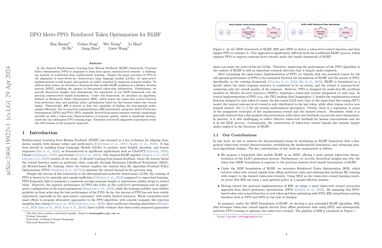DPO Meets PPO: Reinforced Token Optimization for RLHF
In the classical Reinforcement Learning from Human Feedback (RLHF) framework, Proximal Policy Optimization (PPO) is employed to learn from sparse, sentence-level rewards -- a challenging scenario in traditional deep reinforcement learning. Despite the great successes of PPO in the alignment of state-of-the-art closed-source large language models (LLMs), its open-source implementation is still largely sub-optimal, as widely reported by numerous research studies. To address these issues, we introduce a framework that models RLHF problems as a Markov decision process (MDP), enabling the capture of fine-grained token-wise information. Furthermore, we provide theoretical insights that demonstrate the superiority of our MDP framework over the previous sentence-level bandit formulation. Under this framework, we introduce an algorithm, dubbed as Reinforced Token Optimization (\texttt{RTO}), which learns the token-wise reward function from preference data and performs policy optimization based on this learned token-wise reward signal. Theoretically, \texttt{RTO} is proven to have the capability of finding the near-optimal policy sample-efficiently. For its practical implementation, \texttt{RTO} innovatively integrates Direct Preference Optimization (DPO) and PPO. DPO, originally derived from sparse sentence rewards, surprisingly provides us with a token-wise characterization of response quality, which is seamlessly incorporated into our subsequent PPO training stage. Extensive real-world alignment experiments verify the effectiveness of the proposed approach.
PDF Abstract
